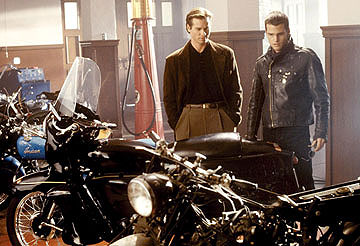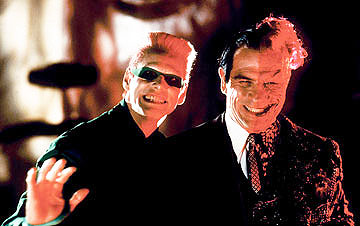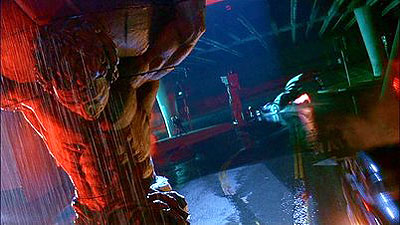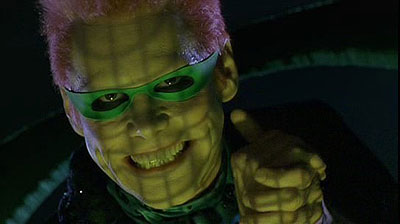In Praise Of Joel Schumacher And BATMAN FOREVER, Part Two
Published on June 13th, 2011 in: Comics, Movies, Over the Gadfly's Nest |By Paul Casey
Since Christopher Nolan’s third Batman film, The Dark Knight Rises, has begun shooting, we thought it appropriate to revisit the frequently maligned Joel Schumacher film Batman Forever, which was released on June 16, 1995. Click here to read Part One.—Ed.

Joel Schumacher is obviously not the most well-read Batman fan ever. This is apparent from some of his befuddling mistakes in the commentary on the Batman Forever Special Edition DVD. He does however, apparently independent of “the rules,” have a very solid understanding of the appeal of the character:
I think the one unique thing that separates him from a lot of super-heroes is that he’s a man. He’s not a super force from another planet; green lasers don’t shoot out of his fingers. And he has all the vulnerabilities and all of the flaws and all of the human drama, that any human being has. He’s not perfect and he’s not impenetrable; he’s a man, not a superman.
Val Kilmer, the man who replaced Michael Keaton, also seems to have a natural aptitude and appreciation for the character:
He’s traumatized from his youth and it’s certainly a fundamental fear that you’re going to lose your parents. He’s raised by someone else, he’s lonely and angry and . . . there’s a goodness in him. He wants to right wrongs. It’s a perfect character, it’s a perfect story.
The things that are most fantastical about Bruce Wayne have to do with basic American Dream ideals. He’s disgustingly wealthy; he’s so wealthy it never comes up. What he chooses to do with his free time is fight an impossible battle against the crime of a city that is corrupt. It’s very wild, very radical, very political.
—From the Batman Forever Special Edition DVD
Let’s compare that with how the co-creator of Batman, Bob Kane, described the character in an interview with NPR, from 1990:
NPR: Why did you make Batman someone without super-powers? I mean, he was a regular mortal who was very fit and very clever but he didn’t have super-powers like Superman did.
Bob Kane: Exactly. For one thing I didn’t want to emulate Superman and imitate it because I thought maybe they wouldn’t want that and I wanted to come up with something original for one thing. And secondly I felt that every person that doesn’t have super powers could relate to Batman a lot easier than they could to Superman.
In other words, you didn’t have to come from another planet to be a superhero. All you had to do was to be born rich, and build your body into perfection and have the urge to go out and fight crime. So, most people liked the idea that Batman never had superpowers, they can relate to him a lot quicker than to a superhero with superpowers.

The only person involved in the production of Batman Forever who treated the material carelessly was Tommy Lee Jones. While clearly evident from the performance he turned in, it was also hammered home by his dismissal of the source material in press interviews in 1995. The notion, however, that this was a group of Gordon Gekko-esque, serio-comic villains taking pleasure in the destruction of the mythology of Batman is categorically untrue.
It would seem to the layperson, who is unaware of the idea that Batman can’t be credible unless he’s snapping spines or engaging in acts of extreme sadism, that Joel Schumacher is basically in line with the most important elements of the character. More so than say . . . um, comic book writer Grant Morrison, who showed a systematic disrespect for the audience and the character by killing Batman at the hands of a God, sending him back in time, and completely dismantling his mortality in every conceivable way? Yeah.
Still, readers are probably objecting to my defense of Schumacher: “But Paul! How can you defend a guy who put nipples on the bat suit?! And how about those huge codpieces?”
Let’s just say that I think those elements are in line with Frank Miller, Jim Lee, or the multitude of other comic book writers and artists who have exploited the female form for the enjoyment of the heterosexual male audience for decades. What Lee or Miller do is acceptable but what Schumacher did is not? I will let you, dear reader, think on the reasoning behind that.

Critically speaking, the response to Batman Forever was nowhere near as negative as some would lead you to believe, despite David Denby and Barbara Shulgasser’s objections. Jonathan Ross, the former presenter of BBC’s prestigious Film show (who took over from Barry Norman), called it “one of the greatest films ever made.” Roger Ebert, although hardly ecstatic, lauded the visuals:
The movie looks great, of course; Gotham City is a web of towering spires, bridges and expressways, planted in a swamp of despond. Boardrooms and laboratories look like German Expressionist sets, and the charity circus could come straight from Murnau’s Sunrise.
And there is a consistent visual motif: two hands clasping in a firm grip. Dick Grayson is caught in such a grip by his acrobat father during a dangerous trick, and later the shot is repeated to show that Bruce Wayne is now his surrogate father.
Ebert’s main criticisms about the film stemmed from problems already existent in Burton’s Batman films, writing that “somehow Batman still doesn’t come alive.” He continued this idea, saying, “Val Kilmer is a completely acceptable substitute for Michael Keaton in the title role, but in all three of the movies, Batman remains shadowy and undefined. The movies exist for their villains, who this time both seem to be playing the same note; the Riddler and Two-Face alternate in overacting, until the pace grows wearying. There is no rhythm to the movie, no ebb and flow; it’s all flat-out spectacle.”
Ebert “liked the look of the movie and Schumacher’s general irreverence toward the material,” remarking that “the great Batman movie still remains to be made.” Not exactly an outright negative evaluation.
Peter Travers from Rolling Stone gave the film a positive review, citing Kilmer’s “deftly understated performance” and Jim Carrey’s “uproarious and artful displays of physical comedy that equal his acclaimed work in The Mask” as being worthy of praise. Travers felt that “as a movie, Batman Forever is in and out but wins in the end by staying true to its unbridled comic spirit.” Again, hardly a flurry of negativity.
Travers also called Stephen Goldblatt’s cinematography “exemplary,” praise that the Academy would echo when they nominated Goldblatt for an Academy Award for his work on the movie. Who would have thought it? Batman Forever received artistic recognition from the Academy. Or perhaps the “art-house rewards committee” which denied The Dark Knight its rightful place as Best Picture nominee, were being their usual superior, pompous selves? Hmm . . .

Financially speaking, the film made $52.78 million in its opening weekend, the highest of 1995. It grossed $184.04 million in America and was the second highest grossing film of the year, behind only the epoch-making Toy Story. Yet rejecting Batman Forever because of its up front commercialism is also to reject a large portion of comic books.
We are now living in the aftermath of DC Comics’ Final Crisis after all; a more cynical crossover I have not seen. And how about all those figurines, costumes, bed covers, pyjamas, underwear, toys, posters, and inflatable aquatic finery advertised to you during the pages of your preferred monthly title? I reckon those are for the artistic betterment of their respective titles, I do.
As with many elements of Comic Book Fandom, this is a case of the vicious double standard. Filmmakers are disallowed even the most basic interpretative permission, while comic book writers can directly contradict what Bob Kane originally intended when he co-created the character. Batman Forever represents a sizable portion of not only the Batman story but also comic books as a whole. What is wrong with presenting a lighter, friendlier, and more-accessible-to-children Batman?
Do Batman’s slightly ridiculous asides in Steve Englehart’s Strange Apparitions terminally mar the seriousness with which he approaches the story? Does everything have to be ultraviolent like Alex to be taken seriously? Must every Batman story of worth have a psychopathic, sadistic War Machine of a hero at its heart? We all take the leap into silliness most months of the year if we read comic books, so let’s stop insisting that the hands of filmmakers are tied in that regard.
I would like those who despise Schumacher for what he did with Batman to consider why it is that Joel Schumacher receives so much grief for his artistic approach. Is it genuinely because of some Foggy Notion of Commercialism versus Artistic Integrity? A lot of those who are now so staunchly anti-Schumacher more likely than not went to see Batman Forever when it was released in the summer of 1995 and more likely than not, they enjoyed it. Maybe it even launched their interest in the character and comic books. Maybe it was one of their favorite films once upon a time. Maybe they just thought it was a fun movie.
Batman Forever presents many comic book fans with a version of the character and the medium that they wish would be forgotten. They feel it damages the credibility of their habit when they bring a girl home or go for lunch with workmates. More than anything, they want acceptance.
They want to believe that they have “grown out” of Batman Forever in much the same way that many critics want to believe they have “grown out” of comic books. Batman Forever (and Batman and Robin if we are being fair) is not a corruption of the character. It is the character. Certainly as much as Grant Morrison’s current vision of Batman or Miller’s cape and cowl sadist, as seen in All Star Batman and Robin, anyway. I think it’s a far purer version than either of those two generally accepted versions of the character. As an audience, we are more than willing to accommodate interpretations which grate against the most basic elements of Batman, just as long as they come in paper form.

As for Batman and Robin: It had to tolerate a slew of notable problems from its beginnings like rushed production time, another re-cast of the lead role, a heavily comic script without a comic presence, and some lousy writing. If B&R had the benefit of a Jim Carrey, it may be looked on differently.
It does have some nice ideas. The Alfred subplot gives us decent scenes, as did the “Robin turning into Nightwing” concept. Batman and Robin is nowhere near the title of “worst film ever made” or any of the other hyperbolic condemnations that inform the film’s reputation. I would suggest a healthy dose of perspective and a trip to the video shop to see some truly irredeemable films, if you believe B&R to be worthy of this description.
When it deals with its primary audience—young children and those similarly capable of leaving behind cynicism—B&R is actually quite successful. And perhaps that is the point. As a group of people, we have to accept that not everything produced under the Batman name has the same aims. Batman and Robin was not a good movie, but as an entry in the lightest spectrum of the character, it’s hardly the worst.
Batman Forever is not the greatest Batman film ever made, either but it is a damn fine vision of the lighter, happier, more openly joyful expression of the character. Joel Schumacher was a sincere, well intentioned director who had a genuine love and appreciation for comic books. His commitment to creating a “living comic book,” adapting the world as it was, retaining the silliness, and the unusual and over the top elements, should be commended by the comic book community.
We will know that the medium has truly progressed into mainstream acceptance, not when we get another superb film from Christopher Nolan, but when we are able to produce another Batman Forever and stand by it, heads held high, praising it for how it speaks to the beauty and joy of countless comic books which don’t have the names Frank Miller or Alan Moore above them.
2 Responses to “In Praise Of Joel Schumacher And BATMAN FOREVER, Part Two”
September 11th, 2012 at 2:31 am
Joel Schumacher actually want to film “Batman: Year One” or “The Return of Dark Knight”, both of Frank Miller, two of the most attonishing Batman comics in the story, more darker and violent that the ridiculous Batman Returns. But Warner Brothers didn’t want it, they want a comercial and more familiar Batman movie, so Schumacher prepare “Batman Forever”. Schumacher want a more increidble Batman concept, more similar to Nolan’s Trilogy, but WB didn’t want it, only want money.
August 12th, 2013 at 3:43 pm
GREAT essay! I am in total agreement, I do not understand why joel schumachers films, especially Batman Forever, are bashed by the supposed “fans”. I have plenty of criticism aimed towards Nolan and his rather bland, boring and long winded attempts at batman. Forever was a childhood film of mine that I have watched countless times, in fact I just watched it the other day, and it was brilliant. for me personally, I think the original anthology of films did all you can possibly do with the character. from dark and gothic to light and colorful, it was all done in 4 films. the recent ones, beyond taking the matieral nauseatingly seriously, did nothing that we haven’t seen before. I want another Batman Forever again! make batman fun and exciting, none of this courtroom dramam bullshit.
Time limit is exhausted. Please reload the CAPTCHA.